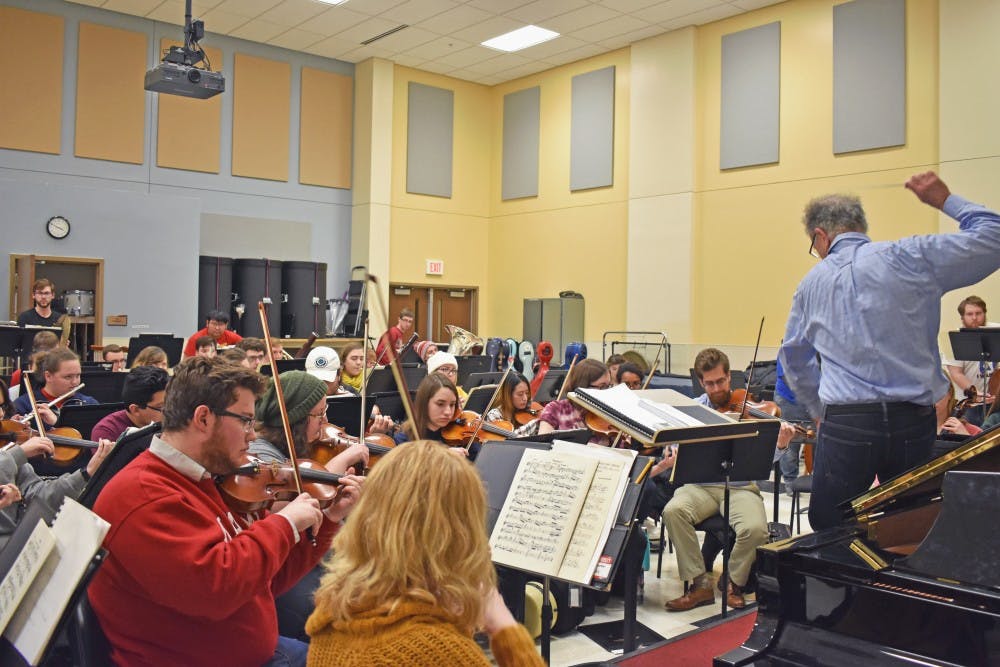When the Miami University Symphony Orchestra played at Cincinnati Music Hall for the first time in the group's history, it didn't feature the work of Mozart or Beethoven -- it featured Glen Davis.
Davis is an associate professor in the music department at Miami who teaches music composition. His piece, titled "Piano Concerto in F Major," was first performed in 2007 by the Sofia Philharmonic Orchestra in Sofia, Bulgaria, after being recorded in 2006 with pianist Michael Chertok.
Composing this concerto has been a long road for Davis, a road so long it goes all the way back to his childhood and the physical and sexual abuse he experienced. While many would have been crushed under the weight of such trauma, Davis transposed it into his music.
"I cried an ocean of tears," Davis said of composing the concerto. "It was a profound experience. It was a horrible and beautiful thing to do."
The concerto is comprised of three distinct movements: "Quanta Play," "The Ascension of Aunt Clarabelle" and "Dream Dance Dali." The second movement sounds the most familiar to listeners with its lyrical qualities, but the story behind it is foreign to many. This movement chronicles the murder of Davis's aunt by his mentally-ill older brother and transforms the harrowing events into music.
The other two movements are born from unconventional sources of inspiration. The first, full of strange and dissonant chords, takes influence from quantum physics while the third mimics the paintings of artist Salvador Dali.
Perhaps the largest source of inspiration for the concerto came from Davis's past in rock music.
"I toured with rock bands and that was my life in the late '60s and early '70s," Davis said. "I like to shake the house."
Davis said an alternative rock outlet was the first U.S. radio station to play his concerto. He believes in a theory he calls "musical universalism," which allows composers to blur the lines between music genres and styles.
"I had always kept the rock and jazz musician in myself separate, but I said 'screw that.' If it sounds right I'm going to put it in there," Davis said. "I'm just an old rocker. I get up every morning and play my electric bass with music by Lady Gaga and Led Zeppelin."
When the concerto premiered in Bulgaria, it was conducted by Ricardo Averbach, conductor of the Miami University Symphony Orchestra, who also conducted the Music Hall performance Monday night.
"He knows exactly what he wants to hear," principal second violinist Taylor Wallace said of Averbach. "He's very meticulous, very clear and he will press on if he doesn't hear what he should be hearing."
Enjoy what you're reading?
Signup for our newsletter
Both Wallace and Davis talked about the collaborative nature of the event. Making it possible required the cooperation of everyone from the dean of the College of Creative Arts to non-music majors, who were bussed to Music Hall to view the performance.
"It's the biggest collaboration I've been a part of," Wallace said. "Everyone in the music department is involved."
Davis, along with Wallace and many of their collaborators, believes the piece has the potential to become part of the canon of piano concertos.
"When [Stravinsky's] 'Rite of Spring' premiered, I'm sure the people sitting in those seats weren't thinking it was a piece that was going to last ages and be the watershed piece of the 20th century," Davis said. "In 40 to 50 years, they'll say, 'I was there -- the first rock and roll concerto.'"
burtismg@miamioh.edu




